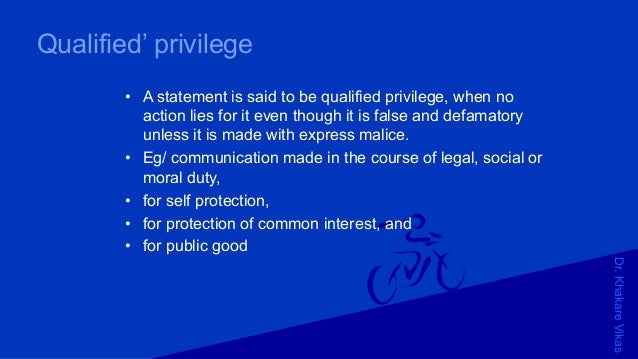What Is The Difference Between Absolute Privilege And Qualified Privilege
Absolute privilege is a complete defense. The defence of qualified privilege may apply where a statement is published to a person who had a legal moral or social duty to receive the.
Defamation A Guide To Bringing Claims And Avoiding Liability Asia Law Network Blog
Qualified privilege only applies if a report is fair and accurate while accuracy and fairness do not apply to absolute privilege.

What is the difference between absolute privilege and qualified privilege. The statutory privilege is limited to information obtained within the scope of the reporters professional activities. Qualified privilege is partial defence against libel or defamation but absolute privilege is complete defence against defamation. The privilege attaching to professional communications between solicitor and client is probably qualified rather than absolute see absolute privilege.
Fast - published at the next available opportunity Accurate - published information is a correct account of proceedings. The privilege attaches to communications and documents made in judicial forums. A qualified privilege is defeated by a showing of actual malice on the part of the speaker but not necessarily by a showing merely that the state-ment was false.
Absolute privilege protects speakers in legislative forums while qualified privilege protects those who report communications in official government proceedings. Now let us see what absolute privilege is. A qualified privilege is defeated by a showing of actual malice on the part of the speaker but not necessarily by a showing merely that the state- ment was false.
Qualified privilege also covers fair and accurate reports of public meetings and various other public proceedings. Absolute privilege applies to statements made in certain contexts or in certain venues. In order for a journalist to have legal protection from being sued their work is required to be.
It is not absolute. The need for accuracy extends to spellings names place names etc and the identification of individuals. 5 rows In absolute privilege communications are not subject to enquiry as to whether good faith or bad.
Absolute privilege can be used as a defence in the legislative forum judicial naval military or State proceedings. A difference between absolute privilege and qualified privilege is. Absolute privilege in defamation law refers to the fact that in certain circumstances an individual is immune from liability for defamatory statements.
On the other hand an absolute privilege will protect the speaker even though the speech is both false and malicious. Qualified privilege is a conditional privilege. Privilege can be absolute privilege which generally refers to comments made in the Dail or Seanad or in a court of law.
The defendant can avail the defence of qualified privilege even though he made the false and defamatory statement deliberately but without malice. In this post however I want to discuss the defence of qualified privilege. The greatest difference between absolute and qualified privilege is that unlike absolute privilege qualified privilege comes with conditions.
What is absolute privilege. The First Amendment privilege afforded to reporters is a qualified privilege. Absolute privilege unlike qualified privilege totally protects a person who has said a defamatory statement against another person from lawsuit regardless of whether the statement was made with malice or not.
When absolute privilege applies to an individuals speech it is irrelevant as to whether the defamatory speech was. On the other hand an absolute privilege will protect the. That is the privilege works as a.
Fast published at the next available opportunity. Unlike absolute privilege qualified privilege comes with conditions. Professional activities may include social gatherings 4320 7 but do not include instances of intentional concealment of the reporters identity as a reporter or instances.
DIFFERENCES BETWEEN ABSOLUTE AND QUALIFIED PRIVILEGE. What is the difference between absolute and qualified privilege. A speech of a Member of Parliament in the Parlimamentary proceedings is protected by absolute privilege.

Stamp With Cynthia Happy Valentine S Day Valentine Day Cards Valentines Cards Valentine Crafts

Brian Froud S World Of Faerie Hardcover January 29 2019 World Faerie Brian Froud Brian Froud Faeries Brian

Inspirational Quotes About Life Diary Love Quotes Some Beautiful Quotes Inspirational Quotes With Images Life Is Beautiful Quotes

Absolute Privilege And Qualified Privilege Infipark Com

Simply Homeschool 2nd Edition Havel Less Fluff And Bear More Fruit Homeschool Home Schooling School

The Ten Commandments Christian Background Ten Commandments Words

Defamation Common Law Defenses And Privileges 1 The Truth Defense 2 Absolute Privileges A Judicial Proceedings B Legislative Business C Executive Ppt Download

Most Common Defenses To Defamation Explained Minc Law

Mike Peters Interview Visionary Fiction Business
Https Democratic Lincoln Gov Uk Documents S584 Qualified 20privilege 20briefing 20note Pdf

Defamation Chapter 4 Libel And Slander Communications Law Comm 407 Csu Fullerton Ppt Download

Sign In How To Find Out Encouragement Parenting

Quotes Go Withing Every Day And Find The Inner Strength So That The World Will Now Blow Your Candle Out Inspirational Quotes Positive Words Power Of Positivity

What A Soulmate Really Is Love Undeniablelove Soulmate Quotesaboutlife Quote Quotes Happiness Positivity Lo Partner Quotes Sick Quotes Loyalty Quotes

Niv Verse Of The Day Matthew 28 18 20 Bible Verse Pictures Matthew 28 Verse Of The Day

The Ten Commandments Christian Background Ten Commandments Words



Post a Comment for "What Is The Difference Between Absolute Privilege And Qualified Privilege"